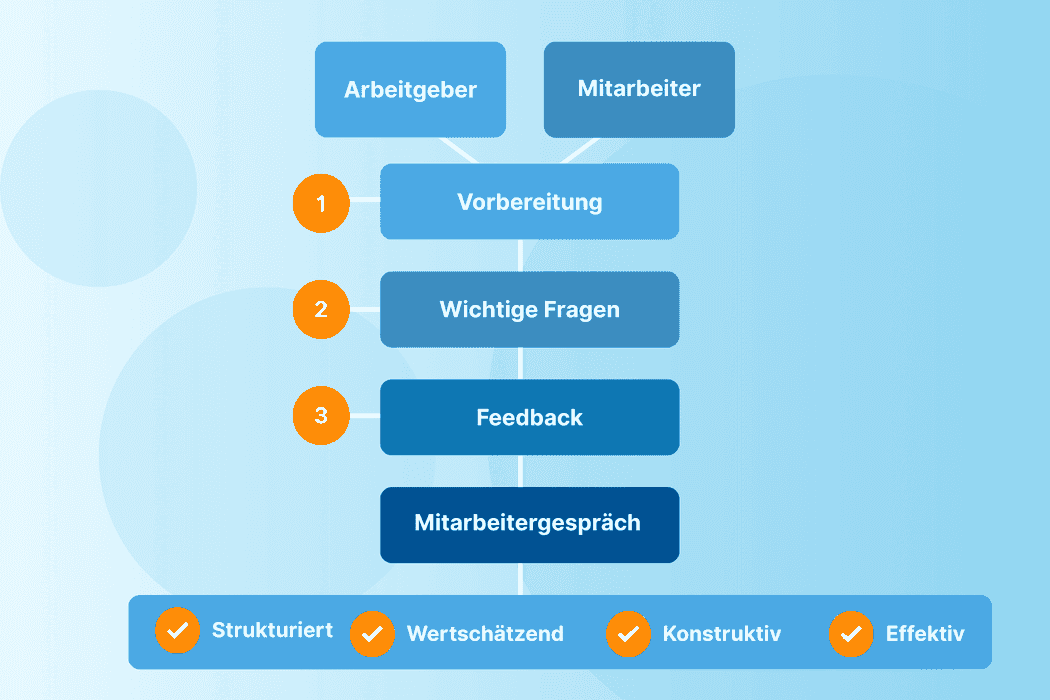Employee-Appraisal – What Should Be Considered?
For employers and employees, the Employee appraisal interview is often associated with fears, worries and stress. We show how it can be done differently.

Once a year it comes up - the employee appraisal. For both employers and employees, the appraisal is often associated with anxiety, worry and stress. But this does not have to be the case. Because properly prepared, the appraisal interview offers a lot of potential to increase motivation and satisfaction in the company.
Employee-Appraisal – Topics and Participants
Performance and career progress, problems in the team or with tasks, but also salary – an Employee-Appraisal should provide time and space for a trusting exchange between employees and their superiors. In three out of four German companies, managers now take the time to talk to their employees at least once a year about the tasks they have completed, development potential, new goals and criticism.
The important thing is that the discussion should be an exchange between equals; wishes, ideas and points of criticism can be expressed by both sides and should also be taken on board by both sides.
Can the Works Council Participate?
Works council members may only participate in an Employee-Appraisal if the following issues are on the agenda:
- Assessment of work performance
- Changes in work processes – e.g., can only be handled with further training or education
- Discussion of remuneration
- Career prospects
- If the employee has expressed the wish to inspect the personnel file
- Complaint about employee discrimination
Employers: Prepare Well for the Annual Review
Central element for employers is the thorough preparation the appraisal interview. After all, if you want to talk to your employee about his or her work over a longer period of time, you need to know exactly what the employee did, what went well and where things went wrong. It is also important to plan enough time for the feedback meeting so that all relevant topics can be discussed calmly, but the employee still has time to contribute their own ideas.
Appreciative Questions in the Appraisal Interview
To get the conversation going and avoid lapsing into a monologue, employers should develop a questionnaire for the performance review. Examples of open-ended appreciative questions might include:
- What is your role on the team and are you comfortable with it?
- What can I do to keep you engaged and motivated to work here?
- What processes could we improve?
- What project would you like to tackle one day?
- What would you like to talk about with me?
- How would you like to develop further?
The last question also helps us to set goals for the coming year. This is because the employee appraisal should also highlight the employee’s potential for further development. Within this framework, employers should formulate concrete target agreements during the discussion.
Employees: View the Appraisal Interview as an Opportunity
As a rule, preparation is everything for employees because every supervisor will ask for a self-assessment at the beginning of the appraisal interview. For this reason, employees should ask themselves in advance which challenges they have particularly enjoyed and mastered especially well – and illustrate this as far as possible with concrete examples and projects.
Prepare Questions for the Feedback Interview
They should also ask themselves:
- What role would I like to play in the company or team in the future?
- How would I like to develop and what do I need to do so?
- But also: What have I learned in the past year and how will that help the company in the future?
- How can I move the company forward?
- What is not going as I would like it to?
The more concretely employees can explain their achievements and successes as well as their exact benefits for the company in the appraisal interview, the better their position will be in the subsequent salary poker game.
Salary Negotiations during an Appraisal Interview
Employees should also be well prepared for the salary question and have a range of increases ready that corresponds to their tasks and market value. In the negotiation, the key is to be tough on the issue but soft on the person – and be open to alternative proposals such as bonuses or non-cash benefits.
Constructive Criticism at the Annual Review / Employee Appraisal
Nevertheless, the appraisal interview also serves as a space for criticism. Here, it is important not to formulate criticism in a judgmental or even disapproving way, and not in a coded way. It is better for employers to express their points of criticism using concrete examples and, in a value, -neutral manner, and to formulate possible improvements that are tangible for the employee.
No one likes to hear criticism. But if they do receive criticism from a supervisor, employees would do well to be open to it. If they show interest and even take on the position of the boss, they can grow from benevolent criticism.
Taking Notes of the Annual Review
Finally, all discussed aspects, agreements and goals of the appraisal interview are recorded in the minutes. Using these minutes, both employer and employee can measure progress in the coming year and check that agreements are being adhered to.
After all, to move employees and the company forward, a certain degree of continuity is needed – from both sides.
Disclaimer
We would like to point out that our website provides non-binding information, which under no circumstances constitutes legal advice. This also, and especially, applies to topics within the sphere of legal HR advise. The content of this contribution cannot and is not intended to replace individual and binding legal advice. For this reason, all information provided is without guarantee of correctness and completeness, but always researched with the utmost care.